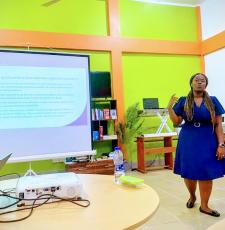
EIFL is participating in Fair Use/Fair Dealing Week, an annual celebration designed to highlight the opportunities presented by fair use and fair dealing, celebrate success stories, and explain these doctrines. In 2018, Fair Use/Fair Dealing Week runs from 26 February - 2 March. Over 45 countries around the world have a fair use or fair dealing provision in their copyright law. In this blog, Teresa Hackett, EIFL’s Copyright and Libraries Programme Manager, highlights EIFL partner countries that have fair use or fair dealing in their laws, as well as fair practice, a distinct but related concept.
In celebration of Fair Use/Fair Dealing Week, EIFL has surveyed copyright laws in partner countries that reflect the concept of ‘fairness’ in the use of copyright protected material. Language on the fairness of permitted uses for purposes such as education, research, criticism or review can be found in the laws of over half of EIFL’s partner countries across 19 countries in Africa, Europe and Asia-Pacific, highlighting the important role of equity in access to information.
You can find the full text of the laws surveyed in WIPO Lex, a global database that provides access to the laws and regulations of WIPO (World Intellectual Property Organization) Member States.
Note that the findings reflect what is set out in copyright statutes and does not take into account court judgements or other rulings that may affect interpretation of the law.
Three concepts with common characteristics
The concept of ‘fairness’ is expressed in three ways: fair use, fair dealing or fair practice. While each of the concepts is distinct, there are common characteristics. Each permits a degree of flexibility as to the amount of the work that may be copied (depending on the circumstances), and the ultimate determination of whether the use is fair or not is made by the courts.
Fair use and fair dealing are general provisions that typically co-exist alongside exceptions for specific uses, while fair practice usually applies to a specific use such as quotation. Since fair practice is most commonly found in the copyright laws surveyed, we decided to include fair practice in our review.
Most countries opt for one standard, either fair use, fair dealing or fair practice, but a few have chosen a combination. For example, Namibia and Zimbabwe have both fair practice and fair dealing in their law, while Uganda utilizes fair practice and fair use.
Benefits of flexible standards
The benefits of flexible standards such as fair use, fair dealing or fair practice are huge.
For legislators, the law stays relevant for longer because it can adapt to technological change, such as the ability to mine large datasets, without the need for a lengthy amendment process (that can take years or even decades to complete).
The law works better for society because it enables these new ways of learning and sharing within the law, thereby delivering education in innovative ways, and reaching more people, through virtual learning environments and other educational platforms.
It is more equitable for people, too, because it takes into account the individual circumstances in making the copy, thus taking the hard edge off the law and removing the risk of unintentional infringement.
The prevalence of fair practice
The most prevalent concept in the copyright laws surveyed is fair practice, found in 16 EIFL partner countries: Botswana, Congo, Ethiopia, Ghana, Malawi, Laos, Lesotho, Lithuania, Maldives, Moldova, Namibia, Nepal, Senegal, Tanzania, Uganda and Zimbabwe.
Fair practice was introduced into the Berne Convention for the Protection of Literary and Artistic Works in 1967, and denotes an objective assessment of fairness to be developed by the courts in each country for free use of such works. It applies to the making of copies for two purposes, that is, quotations (Berne Article 10(1)) and illustration for teaching (Berne Article 10(2)).
Most countries that have adopted fair practice, for example Congo and the Maldives, reflect the uses in Berne. In other countries, such as Lesotho, fair practice is applied to the broader purpose of education, while Malawi applies the standard to a broader range of uses, for example, political speeches and expressions of folklore.
What this shows is that having an international standard set out in a treaty is very effective. (That’s why EIFL is advocating at WIPO for an international treaty for the benefit of libraries and archives).
Fair use and fair dealing: first cousins
Fair use and fair dealing have a different lineage from fair practice, and might be described as first cousins to each other. Fair dealing was first developed by the English courts in the eighteenth century and is now incorporated into copyright laws in the UK and into the laws of many former British colonies and overseas territories. In the US, fair dealing evolved into ‘fair use’ and was codified in the US Copyright Act of 1976. Fair use, that is generally considered more flexible and open-ended than fair dealing, is also being taken up in countries that are not former British colonies, such as Taiwan and Korea, while countries such as Uganda have evolved their fair dealing statutes to include language on fair use.
Five countries where EIFL works have fair dealing i.e. Kenya, Myanmar, Namibia, Zambia and Zimbabwe, while two countries, Laos and Uganda, have fair use provisions.
For a discussion on the evolution of fair dealing in countries where EIFL works, see our blog from last year ‘Fair dealing: to replace or reinstate?’.
round-up of fair practice, fair use and fair dealing provisions
Botswana
The Botswana Copyright And Neighbouring Rights (2000) sets out a range of specified uses (nine in total) including personal use, teaching and libraries and archives. Fair practice is referenced in two of the articles: Article 14 Quotation and Article 15 Reproduction for teaching. In addition, the fair practice uses should be from a ‘short part of a published work’.
Congo
The Law on Copyright and Neighbouring Rights (1982) has fair practice in three places: Article 33(1)(h) and (c) on General Limitations and Article 97 on Limitation of Protection relating to neighbouring rights (performance, sound recording or broadcast). The three articles mostly mirror the Berne Convention.
Ethiopia
References to fair practice in Ethiopia’s Copyright and Neighboring Rights Protection Proclamation (2004) apply to two provisions in line with the Berne Convention: Article 10 Quotation and Article 11 Reproduction for Teaching.
Ghana
When Ghana adopted its new Copyright Act in 2005, it replaced fair dealing with other exceptions. The 2005 Act includes three fair practice exceptions. These are Articles 19(3) and (4) and Article 35 on quotations and illustration for teaching.
Kenya
Legislators in Kenya retained fair dealing in the Copyright Act, 2001 (revised edition 2014).
According to Articles 26(1) and (3), copyright in a literary, musical, artistic or audio-visual work, or a computer programme, shall not include the right to control use of the work by way of fair dealing for scientific research, private use, criticism or review or the reporting of current events.
Note that a 2014 Supreme Court judgement in Kenya appears to have laid the foundation for a shift away from fair dealing towards a fair use style test. See In the Public Interest: How Kenya Quietly Shifted from Fair Dealing to Fair Use.
Laos
The Law on Intellectual Property (2011) in Laos employs both terms fair practice and fair use. Article 111 is entitled ‘Acts Consistent with Fair Use’. Use of works for illustration for teaching is permitted as long as these are compatible with fair practice, and quotations and certain other uses by the press and broadcasters are subject to fair use.
Further, Article 111(2) states that a determination of whether such a use constitutes fair use shall take into account the circumstances as a whole as further described in a specific regulation. EIFL is seeking to obtain a copy of the regulation.
Lesotho
The 1989 Copyright Order in Lesotho has a section called ‘Free Use’ that contains 11 permitted uses. Among these are three provisions subject to fair practice covering quotations, utilization for the purposes of education, and illustration (Articles 9(a)(ii), 20(a) and (b), 30(1)(c).
Lithuania
The law on Copyright and Related Rights of Lithuania (amended up to 2014) permits quotations of a ‘relatively short passage’ of works, both in the original and in translation, for purposes such as criticism and review in accordance with fair practice (Article 21).
The European Information Society Directive (2001), that Lithuania as an EU member state has adopted, similarly has a fair practice exception for quotation in Article 2(d).
Malawi
In Malawi, the standard of fair practice was first introduced in the 1989 Copyright Act. The Copyright Act (2016) carries fair practice forward in six provisions as follows: Articles 39 and 83(1) on quotations; Article 40 on non-commercial critical or scientific publications; Article 50(1) on political speeches, speeches during legal proceedings or public lectures; Article 58(1) on certain uses of works by broadcast organizations and Article 69 expressions of folklore.
Maldives
The Copyright & Related Rights Act (2010) of the Maldives allows quotation of a short part of a published work and reproduction for teaching, in accordance with fair practice (Articles 14(a) and 15(a)).
Moldova
Article 28 of the Law on Copyright and Related Rights (2010) in Moldova permits short quotations of a work for purposes such as criticism and review in accordance with fair practice.
Myanmar
The Copyright Act of 1911, enacted over a century ago, is one of many laws that are currently being replaced in Myanmar. Article 2(1)(i) of the 1911 Act provides for any fair dealing with any work for a range of purposes, such as private study, research criticism, review or newspaper summary.
The draft copyright law (2015) does not include a provision on fair dealing. Instead, the draft law adopts the standard of fair practice for certain exceptions, such as quotation and teaching. In addition, copies of works for research, critique and review is allowed when “fairly used by a natural person exclusively for his own personal purposes”.
Namibia
The Copyright and Neighbouring Rights Protection Act of Namibia (1994) provides both for fair dealing and fair practice. Copyright in the use of a literary or musical work shall not be infringed by a fair dealing for a range of purposes including research and private study, criticism and review, reporting of current events (Article 15(1)). Further, exceptions for quotation and illustration for teaching, that are compatible with fair practice, are permitted (Article 15(3)(a), 15(4)(a), Article 22).
Nepal
Article 17 of the Nepal Copyright Act, 2059 (2002) is the quotation exception. The original Nepali version uses the word “सत्कर्म” meaning “honest practices” that gives rise to some ambiguity in translation. In the English version, the text says ‘some portions of a published work can be cited for fair use’. However, the context and the intention of the article would suggest that it refers to fair practice. (For this reason, we have grouped Nepal with fair practice examples. Thanks to colleagues Jagadish Aryal and Pratyush Nath Upreti for advice).
Senegal
In Senegal’s Law on Copyright and Related Rights (2008), the author may not prohibit analysis of works nor the making of short quotations from the work as long as these are compatible with fair practice (Article 44). In addition, the indication of an author’s name on a copy of a work made available to the public is required to the extent that it is compatible with fair practice.
Tanzania
In addition to the quotation exception, the Copyright and Neighbouring Rights Act (1999) of Tanzania permits a range of uses provided they are compatible with fair practice e.g. use of a work in schools, education, universities and professional training provided (Article 12) and for expressions of folklore (Article 26).
Uganda
In 2006, Uganda expanded fair dealing in its new Copyright Act. Section 15 of the Copyrights and Neighbouring Rights Act (2006) is titled ‘Fair use of works protected by copyright’ introducing increased flexibility for the use of copyright-protected works. The fair uses set out in Articles 15 and 34 are to some degree intertwined with fair practice and include private and personal use, quotation, teaching, reporting of current affairs, political speeches, copying by libraries and educational establishments.
Zambia
Fair dealing features in two sections in Zambia’s Copyright and Performance Rights Act (1994) setting out acts which do not constitute infringement of copyright or rights in performances. The provisions in Articles 21 and 50 mirror each other, permitting fair dealing for research and private study, criticism and review and reporting of current events.
Zimbabwe
The Copyright and Neighboring Rights Act (2000) of Zimbabwe includes fair dealing and fair practice. Article 24 permits fair dealing for research and private study and Article 29 for criticism, review and news reporting. Educational uses of copyright material (Article 25) and quotations (Article 25) are subject to fair practice.
[1] The WIPO Guide to the Berne Convention for the Protection of Literary and Artistic Works (Paris Act, 1971).
SHARE / PRINT









